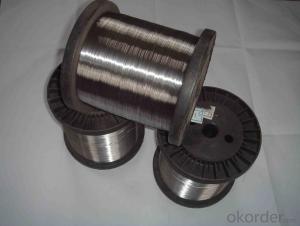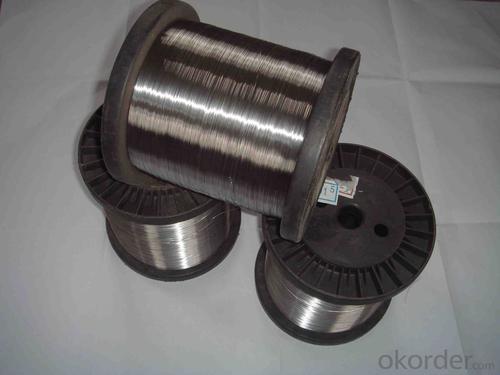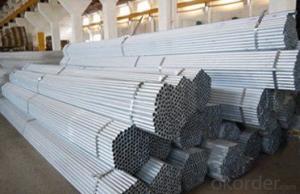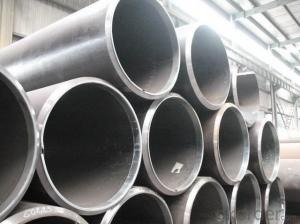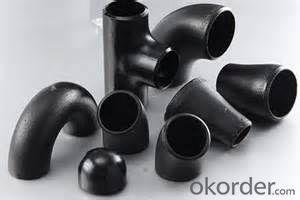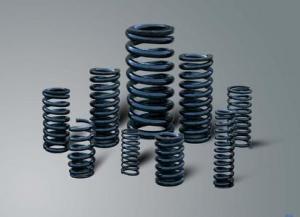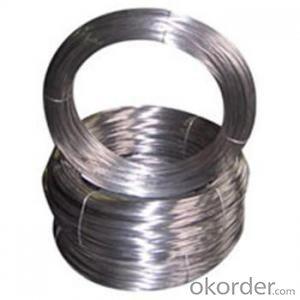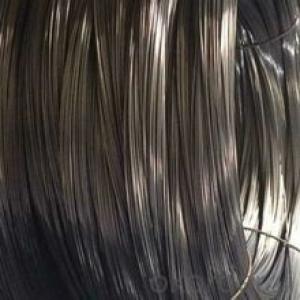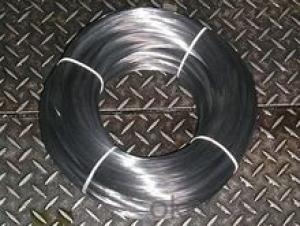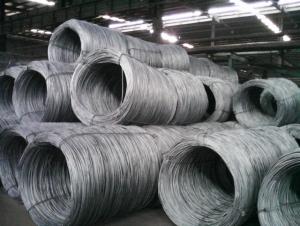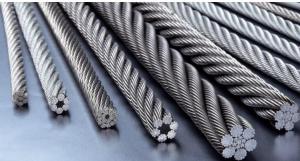Steel Spring Wire Hot Sale and High Quality
- Loading Port:
- Shanghai
- Payment Terms:
- TT OR LC
- Min Order Qty:
- 2000 kg
- Supply Capability:
- 10000 kg/month
OKorder Service Pledge
OKorder Financial Service
You Might Also Like
1.Packing And Delivery
Package: Seaworthy package
MOQ: 0.5 tons
Delivery: 15-20 days
Monthly Output: 100 tons
Payment : 30%T/T in advanced+70% balanced;irrevocable L/C at sight
Remarks: All-risk insurance and accept the third party test
Port : Shanghai
AISI 316 high tensile strength stainless steel spring wire
| Detail as follows: | |
| Standard | AISI,ASTM,GB,SUS etc |
| Grade | 201,202,204,301,303,304,304L,310,316,316L etc |
| Diameter | 0.7mm-14.0mm |
| Surface | Bright or matt |
| Condition | hard |
| Tolerance | +/-0.03mm |
| Length | According to customers’ requirement |
| Packing | Packed by weaved bag or according to customer's requirements |
| Technology | Cold drawn |
| Application | Spring |
| Productivity | 300 tons/month |
| MOQ | 100KG |
| Note | We can produce other standard as the customers' requirement |
1. Competitive price and quality from our own factory
2. Approved by ISO9001, CE, SGS every year
3. Best service with 24 hour`s reply
4. Flexible payment with T/T,L/C , paypal, kunlun bank, western union, etc.
5. Smooth production ability(50000tons/month)
6. Quick delivery and standard exporting package
7. OEM/ODM
- Q: How much is 4 inches steel tube MM?
- 1 inches =25.4 mm;4 inches =101.6 mm;The specification of steel pipe is usually nominal size;
- Q: How does the price of steel pipes vary based on size and grade?
- The price of steel pipes tends to vary based on their size and grade. Generally, larger pipes and higher-grade steel tend to have higher prices due to the increased raw material and manufacturing costs involved. However, market demand and supply dynamics can also play a role in the price fluctuations.
- Q: What is the difference between steel pipes and PEX pipes?
- The main difference between steel pipes and PEX pipes lies in their material composition. Steel pipes are made of rigid metal and are typically used for industrial applications, while PEX pipes are made of flexible plastic and are commonly used for residential plumbing systems. Steel pipes offer durability and strength, but can be prone to corrosion. PEX pipes, on the other hand, are corrosion-resistant and easier to install due to their flexibility. Additionally, PEX pipes have better insulation properties and are less likely to burst in freezing temperatures compared to steel pipes.
- Q: What is the difference between ERW and SAW steel pipes?
- ERW (Electric Resistance Welded) steel pipes are manufactured by rolling metal sheets and then welding the seams using high-frequency electrical currents. SAW (Submerged Arc Welded) steel pipes, on the other hand, are formed by welding the seams using a submerged arc welding process. The main difference between the two lies in the welding method and the resulting quality of the weld. ERW pipes tend to have a smoother and more consistent weld, while SAW pipes have a slightly rougher weld due to the submerged arc process. Additionally, SAW pipes are generally used for larger diameters and thicker walls, while ERW pipes are commonly used for smaller diameters and thinner walls.
- Q: How do steel pipes handle soil movement?
- Steel pipes are highly resistant to soil movement due to their strength and durability. The rigid nature of steel pipes allows them to withstand ground shifting and settling without deforming or breaking. Additionally, steel pipes are often installed with proper anchoring and support systems to further enhance their ability to handle soil movement.
- Q: How do you calculate the pipe flow rate for steel pipes?
- To calculate the pipe flow rate for steel pipes, you can use the Hazen-Williams equation or the Darcy-Weisbach equation. These equations take into consideration factors such as the pipe diameter, length, roughness, and the pressure difference between the two ends of the pipe. By plugging in these values into the respective equation, you can determine the flow rate of the fluid passing through the steel pipe.
- Q: What are the common methods for inspecting the integrity of steel pipes?
- To inspect the integrity of steel pipes, various methods are employed. These methods play a vital role in identifying any faults or weaknesses in the pipes that could jeopardize their structural soundness and potentially result in failures or leaks. 1. Visual Inspection: This method involves a visual examination of the external surface of the steel pipe by an inspector. The purpose is to spot any signs of damage, such as corrosion, cracks, or deformities. Although it is a quick and cost-effective approach, it may not be sufficient to detect internal defects. 2. Ultrasonic Testing (UT): UT is a non-destructive testing method that utilizes high-frequency sound waves to identify flaws in steel pipes. A transducer emits ultrasonic waves into the pipe, and any waves that bounce back are analyzed to detect defects like cracks or voids. UT is effective for inspecting both the internal and external aspects of the pipe and can provide precise measurements of defect size and location. 3. Magnetic Particle Inspection (MPI): MPI is primarily employed to detect surface or nearby surface defects in ferromagnetic materials like steel. Magnetic particles are applied to the pipe's surface, and if there is a defect, these particles will gather around it, creating a visible indication. MPI is particularly useful in identifying cracks and other discontinuities that may not be easily visible to the naked eye. 4. Radiographic Testing (RT): RT involves the use of X-rays or gamma rays to examine the internal structure of steel pipes. These rays pass through the material, and an image is recorded on a radiographic film or a digital detector. This method is effective in detecting internal defects such as cracks, voids, or inclusions. However, it necessitates proper safety measures due to the use of radiation. 5. Eddy Current Testing (ECT): ECT is a non-destructive testing method that relies on electromagnetic induction to assess the integrity of steel pipes. An alternating current is passed through a probe, generating an electromagnetic field. Any alterations in the material's electrical conductivity or magnetic permeability caused by defects are detected by the probe, providing information about the pipe's condition. These represent some of the commonly used techniques for inspecting the integrity of steel pipes. Each method possesses its own advantages and limitations, and the choice of inspection method depends on factors such as the type of defect to be identified, access to the pipe, and budgetary considerations. Regular inspection and maintenance using these methods are crucial to ensure the secure and dependable operation of steel pipe systems.
- Q: Can steel pipes be used for underground fire protection systems?
- Yes, steel pipes can be used for underground fire protection systems. Steel pipes are commonly used in these systems due to their durability, strength, and resistance to fire. They can effectively withstand high temperatures and provide reliable and long-lasting protection against fire hazards in underground environments.
- Q: How are steel pipes used in the construction of oil and gas pipelines?
- Steel pipes are commonly used in the construction of oil and gas pipelines due to their durability and strength. These pipes provide a reliable and safe means of transporting oil and gas over long distances. They are used to create a network of interconnected pipes that can withstand high pressure and extreme temperatures. Additionally, steel pipes are resistant to corrosion, making them suitable for transporting corrosive fluids. Overall, steel pipes play a crucial role in the construction of oil and gas pipelines by ensuring the efficient and secure transportation of these valuable resources.
- Q: There are multiple welded galvanized steel pipe outer diameter 108mm wall thickness 4mm length of 6 meters
- Galvanized steel pipe wall thickness weight outer diameter 108mm 4mm 6 meters in length is about 10.26*6*1.06=65 kg.Kg/m= (outside diameter mm-, wall thickness mm) * wall thickness mm*0.02466= (108-4) *4*0.02466=10.26 kg / MBecause of galvanizing, the weight is heavier than that of ordinary welded pipe 3%~6%.
Send your message to us
Steel Spring Wire Hot Sale and High Quality
- Loading Port:
- Shanghai
- Payment Terms:
- TT OR LC
- Min Order Qty:
- 2000 kg
- Supply Capability:
- 10000 kg/month
OKorder Service Pledge
OKorder Financial Service
Similar products
Hot products
Hot Searches
Related keywords

